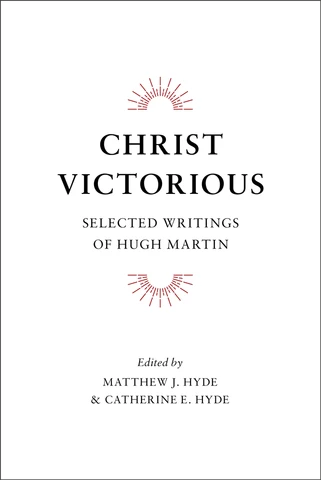
Matthew J. and Catherine E. Hyde
Reviewed by: Iain A. M. Wright
Christ Victorious: Selected Writings of Hugh Martin, edited by Matthew J. and Catherine E. Hyde. Banner of Truth, 2019. Hardcover, 440 pages, $27.00. Reviewed by OP pastor Iain A. M. Wright.
Hugh Martin was a nineteenth century Scottish Free Church clergyman, licensed (as one of his letters states) on May 19, 1843. The significance of this is that he was licensed the day after the Disruption (a division in the established Church of Scotland) which, although it would rob him technically of the title of a “Disruption Worthy,” places him firmly in the Free Church of Scotland from the beginning of his ministry.
In this volume, the reader will find ten sermons, nine essays, and a collection of his letters. Being born a few years after Queen Victoria and predeceasing her by many more makes him very much a Victorian minister. Modern readers may find the style of English a little hard to grasp, with sentences that can run to over sixteen lines, but whatever effort the reader is prepared to make will be rewarded with insights from Scripture and perceptions as to how its teaching harmonizes across the breadth of God’s Word. I found his two sermons on “Heaven: The Scene of Christ’s Priesthood” not only illuminating but filled with much to stimulate the heart as well as the mind in making connections between the worship in the temple and the work of Christ.
In his essays, Martin handles a number of issues judiciously but ever with an eye to the One whose Word he is seeking to expound. His handling of the work of Christ on the cross and how we can talk of Christ’s active obedience in his offering of himself was particularly helpful; Martin offers a response to the oversimplification by which the active obedience is limited to Christ’s keeping of the Law for the believer and his passive obedience is narrowed to the hours upon the cross.
Martin also provides the reader with a very thoughtful defense of the filioque clause: that the Holy Spirit proceeds from the Father and the Son in accord with the Latin West in contradistinction to the Greek East, which holds that the Holy Spirit proceeds only from the Father.
The reader would benefit from having some knowledge of nineteenth century Scottish history, as Martin alludes to the Second Ten Years’ Conflict and the attempt of the Free Church to unite with the United Presbyterian Church of Scotland, and to the William Robertson Smith case. That is not to say such knowledge is essential.
On a couple of occasions, Martin finds himself having to take his correspondent to task. In doing so, he exercises much pastoral warmth even as he challenges wrong ideas. He is certainly providing a model for pastors who find themselves having to correct someone but wondering how best to broach the matter without crushing the person.
The book is from the pen of a thoughtful Christian Victorian gentleman. His love and devotion to his Lord is clear in his preaching, in his lecturing, and in his pastoring.
November 16, 2025
November 09, 2025
November 02, 2025
October 26, 2025
October 19, 2025
October 05, 2025
Raising Sexually Faithful Kids and
Parenting Boys and Girls in a Gender-Confused World
September 28, 2025
© 2025 The Orthodox Presbyterian Church